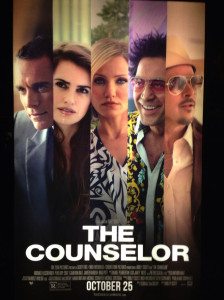I’ve heard it said of jazz drumming that the way to pull it off is to play absolutely everything except the beat. And by playing everything around the beat, but never hitting it, the beat is implied by its absence. It is, in the end, as present as in a pop song, where the drummer (or more probably the drum machine) plays nothing but the beat.
You’ve still got to play in time. You can’t just flail away. It is a far more difficult task to create the beat without playing it than it is simply to play it. It requires a drummer whose very being contains that beat, contains every beat, who with one tap of a cymbal can express the vibe of an entire song.
It’s a tricky business is what it is.
For his first original screenplay, novelist Cormac McCarthy attempts a similar trick, and fails rather spectacularly. It’s called The Counselor, so right off the bat let me just say to Cormac: nice name. So evocative. Really sticks in one’s memory. It’s directed by Ridley Scott, who directed two timeless classics that grow better with every passing year, Alien (’79) and Blade Runner (’82), and fuck-all since. It’s amazing what two early works of genius does to the perception of an artist’s later works. I know, his Gladiator won a Best Picture Oscar, but Mel Gibson and Kevin Costner-directed movies have too, so there you go.
I guess what I’m saying is, what has Ridley Scott done for me lately? Prometheus (’12)? Robin Hood (’10)? G.I. Jane (’97)? 1492: Conquest of Paradise (’92)? I’d like to say that Scott has a brilliant sense of visuals, but honestly to make that argument I’d need point to only two examples: Alien and Blade Runner. Maybe you’d point to Legend and Black Hawk Down, but where does that leave you? Watching Legend and Black Hawk Down? Best not to imagine such a fate.
I’m becoming digressive. Back to McCarthy, who wrote this thing. As a novelist, he can make words do things you had no idea they were capable of. Blood Meridian is one of the most incredible books I’ve ever read. More recently his style has become terse and cinematic, resulting in beautifully written books with plots I swear he swiped from movies. I enjoyed The Road, his post-apocalypse story, but by the end I thought, “Yes, Cormac, I’ve seen the same movies you have.” Nothing original happens in the book but for how it’s written.
No Country For Old Men isn’t an especially good book, at least compared to McCarthy’s greats, with another plot recycled from the movies, but it sure made for an enjoyable Coen brothers flick. It wouldn’t surprise me if it was seeing that movie that inspired McCarthy to write his own screenplay.
Which how does that work out? An original McCarthy screenplay? I’d like to agree with Manohla Dargis of The New York Times when she says she’s paying McCarthy a compliment by pointing out that he’s obviously never read a screenwriting manual. Lord knows we could use more writers leaving behind the tired beats of the screenwriting manuals. People like Shane Carruth, whose Upstream Color is holding strong as best movie of the year. Or Steve McQueen working with writer John Ridley to create, in 12 Years A Slave, a movie with no regard for nor need of a cookie-cutter three act structure.
What we don’t need is a man long on convoluted speechifying with zero sense of cinema.
Which is the problem with The Counselor. It’s not that it’s a dumb movie. It’s full of smart characters who speak in what sound like excerpts from their Ph.D. philosophy theses. The plot, as I alluded to at the outset, is never spoken of but in the most abstract manner. It’s circled around, never spoken of directly. But these scenes have no sense of pace, no sense of momentum, and ultimately no sense of character. We’re left to watch cyphers speaking cryptically, intercut with the occasional burst of violence, without any regard to building suspense or creating drama, until, abruptly, it ends.
The story is barely there. Three men plot a drug deal. The Counselor, never named, an otherwise clean-cut lawyer played by Michael Fassbender. Javiar Bardem as Reiner, high-living party animal, who convinced the Counselor to get involved with the drug deal. And Brad Pitt as Westray, a Texan whose only reason for being is to spout oblique wisdom.
Over the course of the movie we watch a truck being packed with drugs in Mexico, driving to the U.S., being hijacked by other baddies, and finally making it to Chicago. Only that isn’t the important part of the movie. The important part is the three men having increasingly portentous conversations about risk, and imminent doom, and accepting one’s fate, which fate is sealed once a motorcyclist is beheaded in the desert, the secret truck-starting-doohickey is stolen, the drugs are nabbed, and the Counselor is blamed.
Meanwhile, Reiner’s girlfriend, Malkina, played laughably by Cameron Diaz, who despite being at times a fine actress hasn’t the slightest clue how to say anything McCarthy wrote, is crafty and mean, and if you don’t figure out in the first five minutes that she’s the one behind the drug deal going south, then I guess you’ve never seen a movie before, in which case I recommend renting, say, Legend or 1492 rather than suffering through The Counselor.
Penélope Cruz is also in the movie, as Laura. She represents pure goodness and light. The movies opens with she and the Counselor underneath white sheets in a white bed, the light before the darkness. The Counselor proposes to her later on. She is giddy with delight. When, later still, Brad Pitt asks the Counselor if he’s ever seen a snuff film, then describes in detail one in which an innocent woman is horribly murdered, you suspect things aren’t going to work out too well for Laura.
Devin Faraci tells me that Simon Pegg tweeted (I’m trying not to kill myself writing a sentence like that, but such are the times) that the movie is Scott’s Bring Me The Head of Alfredo Garcia, the weird and great and bleak and alienating Sam Peckinpah classic. Faraci goes on to defend The Counselor by describing its bleak outlook in detail, concluding that the movie doesn’t want to be liked. Which is good? Or something? He spends most of the article thrilling to the scene where Diaz spreads her legs and has sex with a Ferrari windshield while Bardem watches, horrified. In recounting the event, Bardem mentions the sucking lips of a catfish. His life was changed forever that night. Bardem has great hair in the movie. By the way.
Anyhow, I’m not so sure movies are sentient beings able to have desires, but beyond that, yes, The Counselor is not a likeable movie. This is not a strength.
I like bleak. I like weird. I like apocalyptic dialogue, especially the McCarthy variety (seriously, read Blood Meridian and know doom). I like the abandonment of standard movie structure. But like jazz drumming, if you don’t know how to make it work, you’re just making noise.
McCarthy doesn’t know how to make it work. The Counselor, if we may give it desires, wants to be a dark, cautionary tale in the film noir mold, where one’s fate is set at the start, where one must accept what is to come, no matter how grim. It wants to be the bolito, a device described at the start of the film: a metal wire loop on a motor. You drap it over someone’s head, pull it tight around their neck, and the motor engages, slowly tightening, until it slices your carotid artery and, presumably, left on, decapitates you. The Counselor wants the same thing: to slowly tighten and build to eventual, inevitable doom.
But it has no build, for it has no drama, and it has no characters. It is a series of ungainly, long scenes of faux humans dancing around a simple plot made needlessly obscure. A great noir makes you feel the hand of doom’s implacable squeezing. You thrill to the fate in store for us all. I’m not sure what one’s supposed to thrill to in The Counselor.








Poor Ridley. Nowhere to go but down, and for such a long time. I seem to recall appreciating some of The Duelists when I saw it the once. And Thelma & Louise certainly struck a chord for many. Might be worth another look.
The rest? G. I. Jane? Robin Hood? Are these even real films or some extended joke? Black Hawk Down was an assault and viscerally draining but not a failure, I suppose. That’s about it.
It’s disheartening looking over his filmography. You think, “Ridley Scott! He’s great, even if he’s made some clunkers.” But after Blade Runner? Yeah, Thelma & Louise was okay at the time. No idea how it holds up. Beyond that, some nice moments here and there, but a whole movie you’d ever want to watch again?